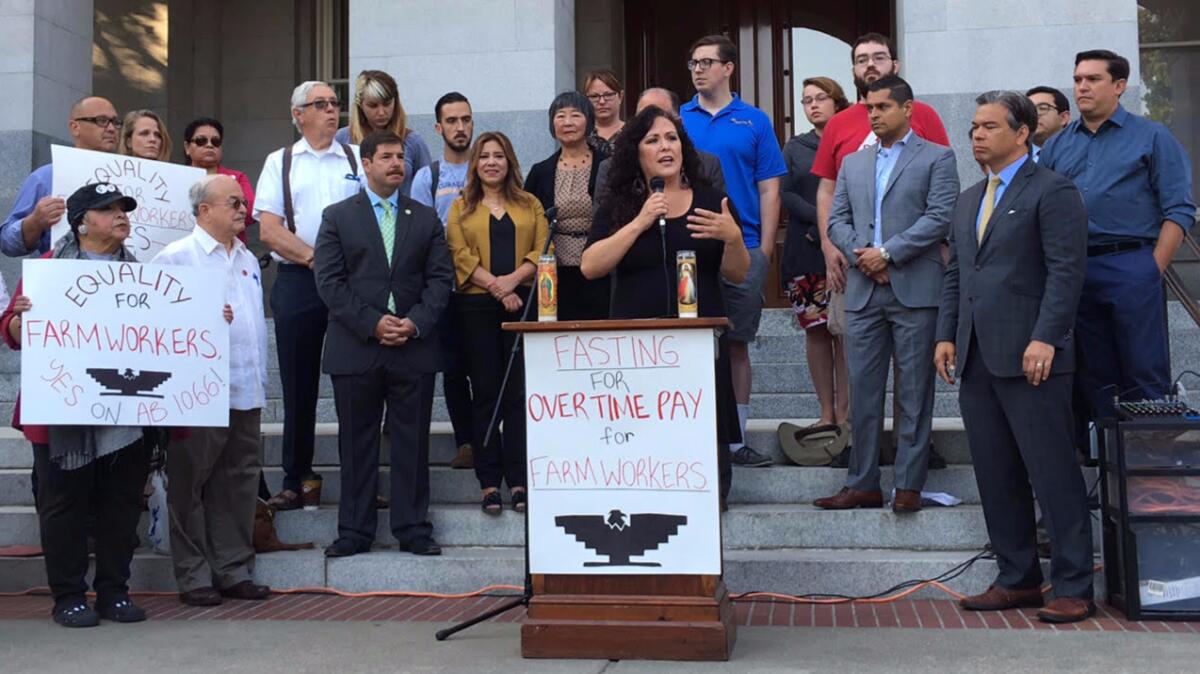California lawmakers expect another showdown on overtime pay for farmworkers

Reporting from Sacramento — On the floor of the California Assembly in June, lawmakers voiced passionate but opposing stances on whether to expand overtime pay for farmworkers.
They quoted scripture. They called upon their own experiences on family farms. They turned to the historic exploitation of black, Latino and Asian laborers in the fields.
The moment was historic for advocates and lobbyists who remember the movement to establish farm workers’ rights in the 1960s and ‘70s: Cesar Chavez walking alongside civil leaders and workers on a pilgrimage to Sacramento, Bobby Kennedy standing with farmworkers in Delano.
In those days, the emotional appeals occurred outside the state Capitol. In June, the fervor had moved to the Assembly chamber, where AB 2757, which would have phased in new overtime rules for agricultural employees, died four votes short of the majority needed to pass.
“I was devastated,” Assemblywoman Lorena Gonzalez (D-San Diego) said. “This is really about whether people who are doing the hardest, most backbreaking work are finally — after decades and centuries of being treated differently in California — going to be seen as equal under the law.”
Gonzalez revived the legislation two weeks later by amending an unrelated bill, AB 1066, that’s now pending in the Senate. The upper house, controlled by liberal Democrats who are generally supportive of farm worker rights, may consider the bill as soon as Monday.
But lawmakers say the most intense debate will once again unfold among Gonzalez’s Democratic colleagues in the Assembly, where the demographics have changed, but where powerful agricultural interests remain.
“I am hopeful that it will get out of the Senate without too much problem,” Assemblyman Rob Bonta (D-Oakland) said. “But it will be a tough vote, a close vote in the Assembly.”
The proposal would roll out new rules for farmworker overtime in 2019, lowering the current 10-hour-day threshold for overtime by half an hour each year until it reaches the standard eight-hour day by 2022. It also would phase in a 40-hour standard workweek for the first time. The governor would be able to suspend any part of the process for a year depending on economic conditions.
The United Farm Workers association, which sponsored the bill, says it addresses an injustice first inflicted on farmworkers nearly eight decades ago. The federal Fair Labor Standards Act of 1938 excluded all agricultural workers, the majority of whom at the time were African American, from minimum wage and overtime standards.
In California, the Legislature exempted farmworkers from earning overtime pay in 1941. That prohibition remained unchanged until 1976, when the state Industrial Welfare Commission ordered overtime pay for farmworkers after 10 hours on the job on any single day and 60 hours in a week. Hourly workers in other jobs across the state receive overtime after eight hours a day and 40 hours a week.
There have been fights over the issue twice before in recent years. Gov. Arnold Schwarzenegger vetoed a similar overtime bill in 2010. Another bill in 2012 passed through both houses of the Legislature but was killed when it came back to the Assembly for a final vote.
Labor rights advocates say that although the momentum of the Cesar Chavez days is past, the chances of success in expanding overtime for farmworkers are greater than in previous years. At the national level, there is a growing recognition that workers at the lowest levels of society need higher wages to survive, they argue, and the bill has drawn support from a diverse coalition of political leaders and organizations, including Democratic presidential nominee Hillary Clinton.
The makeup of the Assembly has also shifted, as more Latinos represent major agricultural districts and thus might bring a perspective once missing in the legislative debate — namely, that of family members or friends who have toiled in the fields.
“Through the years, the idea of excluding agricultural workers from labor protections has become less and less palatable, especially because we know how difficult the work is and how difficult those conditions are,” said Maria Ontiveros, a law professor at the University of San Francisco.
Even so, opposition to an expansion of farmworker overtime remains strong. Prominent business groups, led by the California Farm Bureau Federation and a coalition of agricultural producers, have thrown their political weight against it, saying the legislation saddles farmers and growers with higher costs.
Opponents said farmers in the state’s $54-billion industry are “price takers” — as opposed to “price setters” — who must accept the prevailing prices of products subject to the whims of the weather and international markets.
Greater burdens on them, they said, could lead to higher food prices and spur some growers to leave California.
Weighing the economic impact of the bill is difficult, as researchers say there is limited data on the hours worked by the roughly 829,000 farmworkers in California, more than 90% of whom are Latino and half of whom are brought to farms by crop support services, typically labor contractors.
But farmer associations said the bill could backfire on tens of thousands of agricultural workers who could see their paychecks cut as farmers seek to avoid paying overtime by limiting work hours and hiring more workers.
Eight Democrats voted against the overtime pay legislation in June and seven abstained, even after Assembly Speaker Anthony Rendon (D-Paramount) rose on the floor to urge legislators to support it. Some have not changed their stance.
Assemblyman Adam Gray (D-Merced) said he is opposed to adding another layer of cost on the agricultural community without addressing both burdensome regulations and the state’s ongoing water crisis.
“If we are going to move on the overtime issue, we should be moving a comprehensive package of bills that support the agricultural community,” he said. “No relief on water, no relief on regulation — it is not good enough.”
Gonzalez, whose role as chair of the Appropriations Committee often puts her in disagreements with colleagues over which bills live or die, faces a steep political climb to win the necessary votes.
To spark support for AB 1066, she and more than 100 religious leaders, families and elected officials embarked on a 24-hour fast this week. Another 2,000 members from the Courage Campaign, a statewide liberal activist group, joined the effort, which concluded Wednesday with prayers and songs in a Sacramento church.
For Gonzalez, the bill is personal, she said. Her grandfather was a bracero, a seasonal agricultural laborer, and her father worked in strawberry fields near Oceanside when he first came to the United States.
AB 1066 eases in the additional overtime pay rules, she said.
“It’s a very slow process by which we get to an eight-hour day,” Gonzalez said. “I think as we see temperatures rise in those fields, as we see larger and larger farms operating, the time has come to do this.”
On the Assembly floor in June, dozens of farmworkers watched from the balcony as lawmakers clashed on whether that was true.
Some Assembly members pointed to California’s existing laws, saying it is one of a handful of states that already provide some form of overtime.
Assemblyman James Gallagher (R-Nicolaus), whose family farms is in rural Sutter County, said the bill was not needed and would harm small farms like his, where workers were part of the family.
“My family has worked the land for six generations,” he said. “You treat your workers fairly. You pay them a fair wage.”
But Assemblyman Joaquin Arambula (D-Kingsburg), who quoted from the Bible, said that as a doctor, he had treated farmers who were in poor health after working too long under the sun.
“After much thought, I decided to support this,” he said. “I realized this was a measure of equity.”
ALSO:
California lawmakers, faith leaders begin fast in support of overtime pay for farm workers
Assembly kills bill to give California farmworkers overtime pay
Updates on California politics
More to Read
Get the L.A. Times Politics newsletter
Deeply reported insights into legislation, politics and policy from Sacramento, Washington and beyond. In your inbox three times per week.
You may occasionally receive promotional content from the Los Angeles Times.











